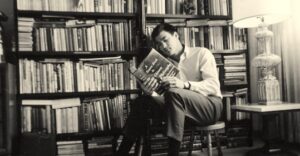Men are a marketing demographic. Retailers know this, and market accordingly. Check any website or catalog that carries goods for both men and women. The retailer segregates the two, and makes separate appeals based on what motivates each sex to “Buy! Buy! Buy!”
So why the heck are publishers ignoring men? I noted in my previous post the publishing industry ignores men in favor of women, and by extension, so do authors. Why write off half of the potential marketplace?
That doesn’t sound like a wise business strategy to me. Perhaps that’s why traditional publishing is constantly re-trenching and brick-and-mortar bookstores are in trouble. I remember when there were scores of publishing companies. All independent. All vying for authors and their books. Today they are all imprints or divisions of 5 mega-corporations. A very sad state of affairs.
So why do publishers and many authors ignore men? It’s because they believe the myth that men don’t read, and especially don’t read fiction. Note the operative phrase: believe the myth.
Not that long ago I read some publisher’s statement that if it wasn’t for women the novel would be dead. That kind of thinking excludes men from the publishing marketplace. It is gender bias in the extreme.
Popular indie author Mark Dawson has said that the readership of his John Milton thriller series is more or less evenly split between men and women. Perhaps somewhat shading towards men, but not by a large margin.
The books in the series generally rank in the top 5,000 in the overall paid Kindle store and in the top 100 of such sub-categories as Crime Action & Adventure.
Readers buy hundreds of Dawson’s books every day and at least half of them are men. And he is just one writer.
As I noted in my previous post, Michael-Scott Earle conducted 2 very successful Kickstarter campaigns this year marketing to men.
Men don’t read fiction? Rubbish!
However, I will concede that there are men out there who don’t read fiction (in fact, I know one).
So for those men in your life who don’t read fiction, this post is for them.
I’m going to riff off of an Art of Manliness blog which is very good and I encourage everyone to read it.
Reading fiction is good for people in general, but is especially good for men who lack in some of the skills at which women naturally excel. Yes, guys, the women have us at a disadvantage and we need to play catch up. So let’s have at it!
Reading Fiction Strengthens Your Theory of Mind
At the risk of over simplifying, theory of mind is our ability to perceive what others are thinking, feeling, and perceiving. It’s our ability to get inside another person’s head. It’s our ability to “read” another person.
We see someone smile. Theory of mind is what tells us if, to us, the smile is warm and genuine, or perfunctory, or phony.
The famous poisoned cup scene in The Princess Bride is a hilarious example of theory of mind at work.
On the opposite side of the coin, when a baby puts his hands over his face and thinks because he can’t see me that I can’t see him — that’s a theory of mind fail.
Women are better at theory of mind than men. However, there’s an easy way for men to strengthen their theory of mind muscle — yep, that’s right: read fiction.
Studies have shown that reading fiction strengthens one’s theory of mind. So let’s hear it for reading fiction!
Reading Fiction Makes You More Empathetic
Empathy is when you feel what the other person is feeling. Empathy is having the same emotional reaction as someone else.
If my friend tells me his mother died, I know what he is going through because I’ve had the same experience. And most likely experienced the same emotions he is experiencing.
Women are generally more empathetic than men. So once again, guys, we need to even the score. We need to read fiction on a consistent basis to strengthen those empathy muscles.
Why is empathy important? Humans are creatures of feeling. Sure we think. But feelings are primary. They are lodged in the oldest part of our brains.
When we can share feelings with another person, doing so builds a bond between us and them. And that breaks down barriers. Bonding builds relationships and civilizations. Civilizations you say? Yep. Because a civilization is nothing more than a group of people who’ve bonded together.
So, men, if you aren’t reading fiction — hop to it! We have a civilization to build!
Reading Fiction Increases Creativity
Reading fiction is a form of play. A form of make believe.
Reading fiction allows you to experience the world in new ways, or to experience new worlds. Fiction allows you to pretend you’re someone else, and do things you’d not normally do — or maybe never do.
Fiction allows us to re-evaluate beliefs. It challenges our preconceived notions. Makes us defend, or toss, our beliefs.
Nearly half of us are at least in part kinesthetic/tactile learners. That means we learn best by acting and playing and by hands on experience. In other words, we learn best by doing something while getting the information.
Fiction reading, being a form of play, is one of the best ways for kinesthetic/tactile learners to learn new ideas, to learn about life. This is especially true if the reading experience is out loud and shared with one or more people.
Fiction stimulates our creativity. It helps us to be dynamic, creative beings. So, guys, let’s read some books!
The Type of Fiction Doesn’t Matter
The positive effects upon the mind of reading fiction are not tied to a specific genre or “quality” of fiction. In this case, all fiction is equal.
Read the classics. Read westerns, or sports stories, or spy thrillers. Read comic books or graphic novels. It doesn’t matter. It’s all good.
What does matter is that you read — and that you read fiction.
So men, if you aren’t reading fiction, pick up a book and dig in. Or get an audio book if you’d rather listen. It’s all good.
Women may be from Venus, but men are from Mars — and Martians read fiction!
Comments are always welcome! And until next time, happy reading!
 CW Hawes is a playwright, award-winning poet, and a fictioneer, with a bestselling novel. He’s also an armchair philosopher, political theorist, social commentator, and traveler. He loves a good cup of tea and agrees that everything’s better with pizza.
CW Hawes is a playwright, award-winning poet, and a fictioneer, with a bestselling novel. He’s also an armchair philosopher, political theorist, social commentator, and traveler. He loves a good cup of tea and agrees that everything’s better with pizza.
If you enjoyed this post, please consider buying me a cup of tea. Thanks! PayPal.me/CWHawes
Share This!
